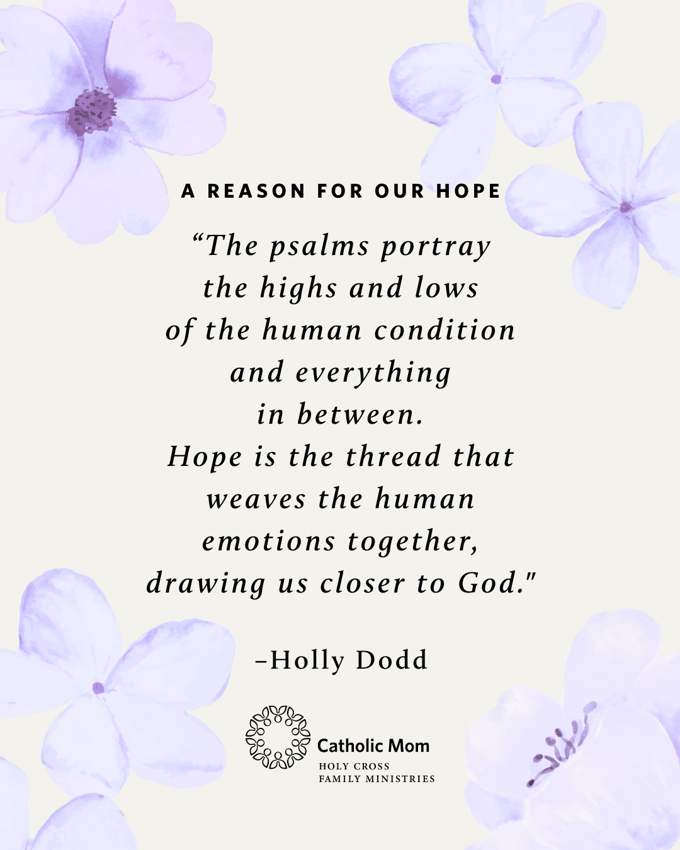The psalms are deeply emotional. Read the Psalms and you will find joy, gratitude, sorrow, and despair. You will find guilt and regret. You will find resentment and frustration. You will find peace and contentment. The psalms are replete with human cries to God that span the spectrum of emotions.
Praying the Liturgy of the Hours Became My Anchor
Several years ago, I was reintroduced to the Psalms through praying the Liturgy of the Hours. When I began praying the hours, specifically morning and evening prayer, I was grieving a tragic loss. Routine prayer became the anchor of my days. My emotions were all over the place and were frankly unpredictable. Some days I felt okay, some days I felt numb, and some days I felt unstable and could hardly recognize myself. I would feel profound sadness one moment and then a little while later, a rush of overwhelming gratitude. I would feel cheerful and social, and then suddenly want to run and hide from the whole world.
I began a routine of praying the Liturgy of the Hours, and I heard something profoundly familiar in the cries of the Israelites. As I prayed morning and evening, day after day, I found comfort in the rhythm and repetition. The more I became familiar with the psalms, the more I realized that these were not only the songs of the Israelites, these were the timeless songs of my own heart.
The Psalms Paint Pictures of Human Emotions
I was struck by the beauty:
The daughter of the king is clothed with splendor, her robes embroidered with pearls set in gold (Psalm 45:13)
I joined in songs of praise:
The Lord is great and worthy of praise, to be feared above all gods (Psalm 96:4)
I was taken aback by the betrayals:
But it is you, my own companion, my intimate friend! (Psalm 55:13)
I felt profound sadness:
They have poured out blood like water in Jerusalem; no one is left to bury the dead (Psalm 79:3)
I longed for God:
My body pines for you, like a dry, weary land without water (Psalm 63:1)
Hope is Woven Throughout
Early in my grieving process, I clung to this rhythm of the daily hours. One day, at the end of a particularly hard day, I just couldn’t bring myself to pray anymore. I was confused by my own feelings and my inability to pray. I physically clung tightly to that prayer book because something inside of me knew I needed the prayers that I couldn’t bring myself to utter. I tucked my book of Psalms under my pillow and held it tightly as I cried myself to sleep.
The next day, still unable to pray, I had a revelation. I realized I was angry at God, but I still loved Him deeply. I wanted to beat on His chest in rage and then fall asleep soundly in His loving embrace. Looking back now, I recognize an underlying current uniting these emotions that is echoed in the Psalms. I realize now that what I was feeling underneath it all was hope. I was frustrated, angry, and sad, but I trusted in God's love and care for me. I had hope that all was truly well, and that God's plans were bigger and better than mine, even when I didn't understand them.
Just like my own emotions, the psalms varied day to day, but hope was the constant that prevailed throughout. There was hope behind the sadness; there was hope behind the joy; there was hope behind the betrayal; there was hope behind the praise. No matter the emotion, there was always hope. Without hope there would be no reason to cry out to God at all.
There is something about the constancy of hope that I couldn’t understand before personal tragedy. Tragedy was the catalyst, but the psalms, specifically the liturgy of the hours, became the window through which God chose to show me hope. The psalms gave me permission to walk forward confidently with hope even when I felt broken or betrayed, knowing that God was with me.
They go out, they go out, full of tears, carrying seed for the sowing: they come back, they come back, full of song, carrying their sheaves. (Psalm 126:6)
These praises and lamentations, prayed for thousands of years, reveal a confident and comforting hope in the faithfulness of God that remains true for us still today. The psalms portray the highs and lows of the human condition and everything in between. Hope is the thread that weaves the human emotions together, drawing us closer to God.

Author's Note: The psalm text above comes from the Liturgy of the Hours: Divine Office, which uses the 1963 Grail Psalms (with some exceptions). To learn more about praying the liturgy of the hours, I recommend iBreviary.com or SingTheHours.org.
For the Jubilee of Hope, our writers reflect on prayer as a source of hope in their lives.
Copyright 2025 Holly Dodd
Images: Holy Cross Family Ministries